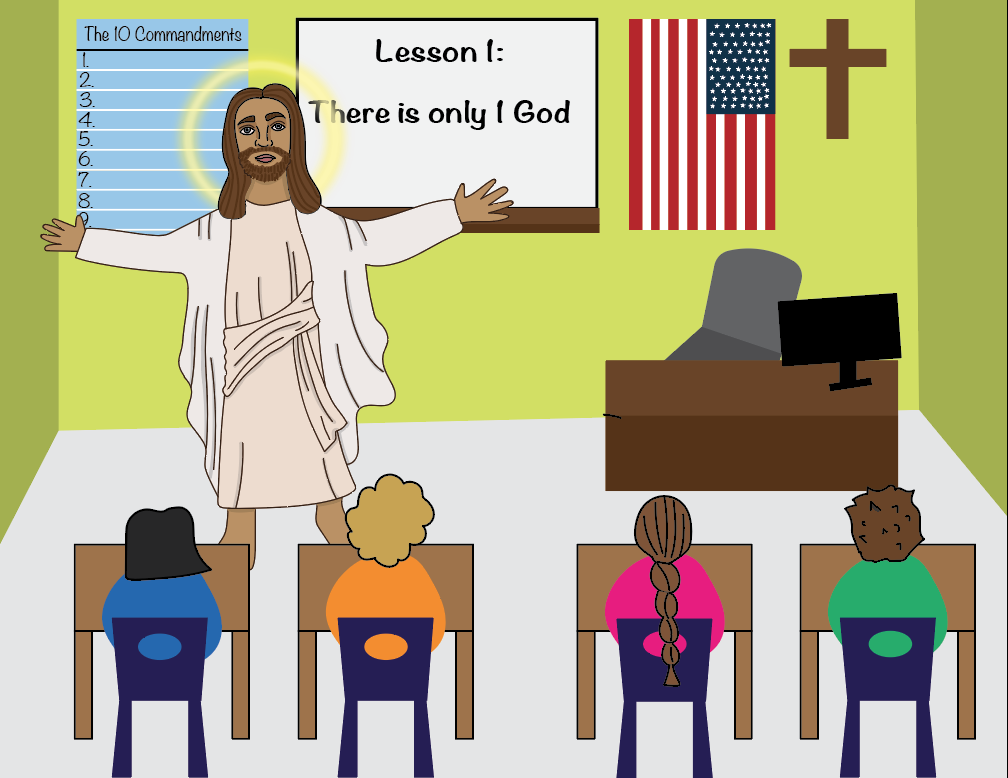New Texas legislation is violating the First Amendment.
Texas public school classrooms may not get enough funding for clubs or school supplies, but don’t worry, posters showing the Ten Commandments are fully covered. On September 1, Senate Bill 10 (SB10) went into effect, stating that a 16-by-20-inch poster or framed copy of the Ten Commandments must be clearly posted in all Texas classrooms. The law specifically uses the Protestant Christian Ten Commandments, which is a list of rules that declares principles in which one should live in harmony with God and other human beings. They focus specifically on having a good relationship with God and treating the people around you correctly.
Many Texas families stemming from different faiths are outraged over this ruling and have filed legal complaints to stop school districts from implementing it, leading to a preliminary injunction for multiple districts. This means that the districts that this injunction applies to do not have to follow SB10 until a decision is made on the issue.
It should be illegal for the Ten Commandments to be displayed in public schools because it encroaches on our constitutional rights and brings religion into areas where it is not prevalent.
In the First Amendment, the Establishment Clause states that the government cannot establish a religion. The fact that the Protestant Christian version of the Ten Commandments is the one expected to be used is inching closer to violating the Establishment Clause. Though many different religions have their own rules similar to the Ten Commandments, the limitation of the law seems almost like an establishment of religion by the Texas government.
Additionally, the Establishment Clause supports the separation of church and government, which is clearly being violated if the state requires religious documents in a non-religious setting.
Similarly, the Free Exercise Clause prohibits the government from controlling how citizens express their religion. Displaying these posters in classrooms, though it may not be directly taught to them, pressures children into complying with these specific religious views. Religion is something that should be explored and decided in one’s own or with one’s family. Not in schools, where there is very little discussion about religion.
Not only is the new legislation simply unconstitutional, but it can also create uncomfortable environments for those who do not follow the Christian religion. According to a study conducted by Pew Research Center, about 67% of Texas citizens identify with Christianity, leaving 33% of citizens who identify with another religion, or none at all. This can make children in Texas classrooms who are in this 33% feel like they are doing something wrong by having different beliefs, especially young children who are still finding out who they are.
Texas legislators and supporters of this bill claim that the display of the Ten Commandments promotes good behavior since it is the foundation of the nation’s heritage. While religion was an important part of America’s beginning, many people also came to America to escape religious persecution. Making the claim that children need to look at the Ten Commandments in classrooms due to the history of America is not only wrong morally, but it’s also based on a false interpretation of history and American ideals.
Conservative lawmakers claim that those who do not support this bill are “woke” radicals who want to erase the history of the nation; yet the people against this bill are only trying to protect the children of Texas.
I do not think that public schools should be completely religious-free zones where students cannot express themselves through their religion. However, the displaying of the Ten Commandment posters is unconstitutional and can make children who do not share those beliefs uncomfortable. SB10 should be outlawed and, furthermore, the government should never require public schools to present any sort of religious material in classrooms.
This law represents only the beginning of what could become a series of increasingly aggressive efforts to force religion into public schools. Many Texans have already reached out to their lawmakers to express outrage and concern, warning that this legislation undermines the very freedoms and rights guaranteed by our Constitution.
We have the same opportunity to make our voices heard by standing alongside organizations such as the American Civil Liberties Union and the Freedom From Religion Foundation which are actively fighting to protect the principle of the separation of church and state. By supporting their lawsuits and advocacy efforts, we can help defend both the integrity of public education and the constitutional rights of all students.









